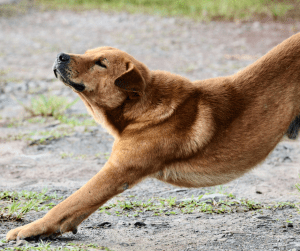Why Does My Dog Yawn?
Yawning is not just a sign of tiredness in pet dogs. Many experts believe it is a much more sophisticated form of canine communication. Read our Holidays4Dogs article to find out more about why dogs yawn.
Scientifically speaking, there is still no definitive answer why human beings yawn, let alone dogs. However, there are several theories. Some behaviourist experts claim yawning represents a calming signal to other dogs – or people – and is a way of communicating appeasement.
It is also suggested that yawning is a way of preparing the body for action. Yawning fills the lungs with a burst of oxygen – not just in dogs, but humans too.
Of course, dogs also yawn because they are feeling tired, in the same way we do. However, to understand why a dog is yawning it is important to consider dog’s the situation in which he is expressing the behaviour.
Yawning in context.
Stress factors –
Experts in canine behaviour suggest that dogs may yawn to communicate they are feeling uncomfortable, or anxious. Many dogs, for example, don’t like being hugged. Paying attention to these signs can help an owner to understand their dog’s emotional state.
In addition, it enables the astute owner to remove any stress factors that might be causing the dog to feel anxious. Additional indications the dog may be feeling stressed are ; –
-
Yawning in succession (one after another).
-
Ears laid flat, or pinned back.
-
Lip licking.
-
Panting, drooling.
-
Tail tucked under.
-
pacing.
-
Evasive behaviour – looking away, trying to get away.
Excitement and happiness –
Yawning can also be a sign of excitement, or anticipation of something good happening. You may notice your yawns while you prepare his dinner, or pick up his lead before going for a walk. He may also shake his head, or make a noise at the same time he is yawning, which is an added expression of excitement.
Boredom –
Yawning can also be a sign of boredom. If dogs don’t get enough physical, or mental activity – yawning can occur. Other behaviours associated with boredom might include, digging, chewing, pacing or general excitable behaviour.
Dog tired –
Equally, dogs may yawn when they are tired, the same as people do. Dogs actually need quite a lot of sleep and not getting enough can result in tiredness and fatigue. Dogs should always have a quiet and comfortable place to retreat to to rest. Also, if your dog seems tired, check there is nothing that might be preventing him from getting rest, such as an underlying health condition – i.e. arthritis.
Yawns are catching in people and dogs.
Studies have found that dogs will copy yawns when they see, or hear, familiar people yawning. Scientists concluded, the reason why yawns are ‘catching’ is a sign of empathy between human beings, as well as between people and their pets – a quite extraordinary phenomenon.
between human beings, as well as between people and their pets – a quite extraordinary phenomenon.
In one particular study, many of the canine participants who engaged in contagious yawning, subsequently fell asleep. Researchers felt this behaviour pattern was no coincidence.
Scientists suggested the dogs were interpreting the yawns as a signal to be calm. They tested this hypothesis further by monitoring the heart rates of the dogs.
This was to make sure the yawning was not associated with any stress factors. The results of such studies certainly gave weight to the fact that, the bond between people and their canine pals seems to be mutual.
Conclusion.
In general, yawning is a perfectly normal behaviour in dogs. and is usually nothing to be worried about. However, if you notice other stress signs, or your dog seems tired or weak if would be advisable to get him, or her, checked out at the vet.
The reasons for yawning are still a bit of a mystery among experts and scientists and there is still much to learn about how animals communicate with each other and with us.


